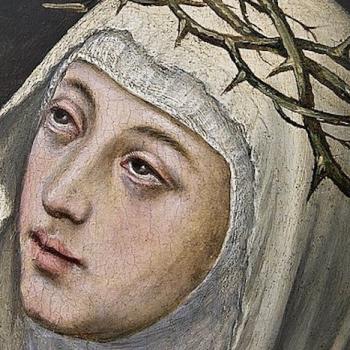
The Prodigal Son as a Parable of the Trinity
A reader of my book Leaving Emmaus: A New Departure in Christian Theology asked an insightful question about the Trinity. She was paying attention to my interpretation of the triune God through an analogy of gift exchange.
I offer a reading in the chapter in question of the Prodigal Son, suggesting that the first half of the parable might be a verbal icon of the Trinity. We have in the story a father and son, but we also have what I call “a third something,” evident in the way the narrative is unresolved until that something appears.
The father waited to see not just his son, which could have happened anytime he wanted, but his son plus the gift of his son’s returning…. Likewise the son waited, though dared not hope, to see not only his father, but his father plus the surprising gift of his father’s recognition of him as son. (46)
The third something is “spirit,” or the gift of the relationship itself. The moment of embrace in the middle of the road, then, is a trinitarian moment of gift exchange. As in the story, the doctrine of the Trinity says that the Father gives being to the Son, then sends a Gift of love to the Son so that the Son will know himself as his Father’s Son. And the Father will know the Son as his Son.
This is, further, the pattern of all created life. All creatures are constantly finding themselves within relationships of beloveds and lovers, such that love becomes a life-giving “third something” between them. Augustine helped me say this: “You may,” he puts it, “say ‘I see love, but I don’t see a trinity.’ Ah, but if you truly see love, you already see a trinity.”
A Good Gift
So that’s what this reader was considering when she asked her good question. “What does the Second Person of the Trinity give to the Third?”
Perhaps you’re saying right now “that’s exactly the kind of abstract nonsense a theologian would consider insightful.” Well, I won’t try to convince you that theologians don’t talk nonsense—we certainly do, and when we’re lucky (as I’ve been lucky) we sometimes we get paid for it. But in this case, I think I can point out some rich soil around this reader’s curiosity.
This is a little easier to see if we put a tangible object in place of the “third something” in the parable. Imagine a gift exchange. You discover something you want to give me. A winged cast-iron pig, say. (Just to take a random example of a good gift I once received.) You have given something not only to me: you have also given something to your gift. It was only a winged cast-iron pig at a second hand shop. Now it is a gift.
Further, if I receive it poorly, by barely noticing it, say, I have broken down the exchange by not giving you something. I have failed to give gratitude, or acknowledgment.
The Gift and the Receiver
So look: the Father (Giver) gives to the Son (Receiver). The Father also gives to the Spirit (Gift). The Son gives to the Father. The Spirit gives to both, in that the relationship itself, extending to both Father and Son, is a manifestation of the exchange. The Spirit is Gift; what the Spirit gives is a gift from the Gift. The pig gave my friend a chance to be my giver, and gave me a chance to be the one gifted by a friend.
But: does the Receiver give anything to the Gift? Do I give the pig anything? Trinitarianly: does the Son give anything to the Spirit? There are filioque implications here which I will pass up for now. Click that link if you have no idea what that means but would like to. If not, let’s stick with the analogy for a moment before heading back to scripture.
When I received that gift, and I acknowledged my friend, as giver, with gratitude, did I give the gift anything? I think I did, actually. He gave it as gift, I gave it my own concurrence: yes, I implied, this is a gift. I love, l-o-v-e, my winged cast-iron pig. I love also the one who gave it to me. Those loves are connected, but they are also different. By agreeing with my friend that “this is a gift,” I trust the gift that he gave me. I give it my trust. I give it continuing life as the gift I trust. I place it on an end table, where I can keep loving it.
What does Jesus give to the Spirit?
In John, Jesus says to the disciples “I will pray to the Father, and he will send you another gift.” Here’s what I think he means.
I have received a good Gift from the Father. It’s name is Spirit, and I have given this Gift my trust. I love the Gift in a way related to the way I love the Father, but distinct. I love the one I call Father, and I love the life-giving Gift the Father has sent me.
Now I am departing this world, and you will stand in my place as the Beloved Recipients of the Father’s Gift. You will be little second person’s of the Trinity, receiving Gift (3rd) from the Giver (1st).
And you can give your trust to this Gift. It will blow where it pleases (Jn 3:8), take you places you don’t want to go (Jn 21:18). It will occasionally pierce your hearts like a sword (Lk 2:35). And if you give this Gift your trust, as I have, you will find yourselves caught up in the love of God that is the deep pattern at the heart of all things.
Sometimes head-scratchy abstract theological questions can take us to new contemplations of God. Good conversation partners are like that. And I’m grateful for them. They are a gift.










